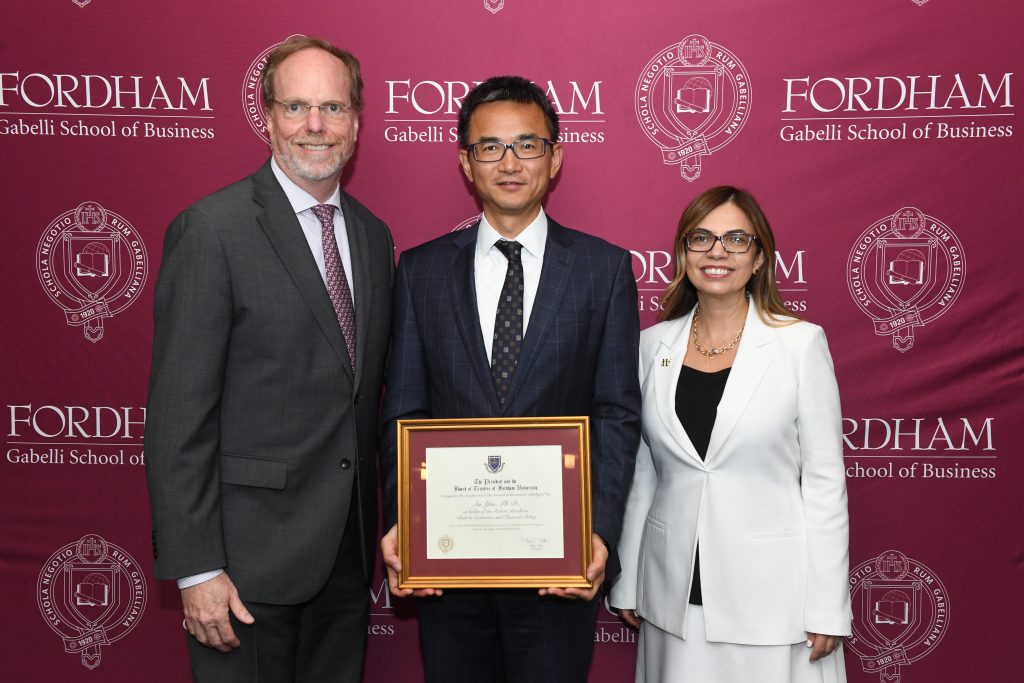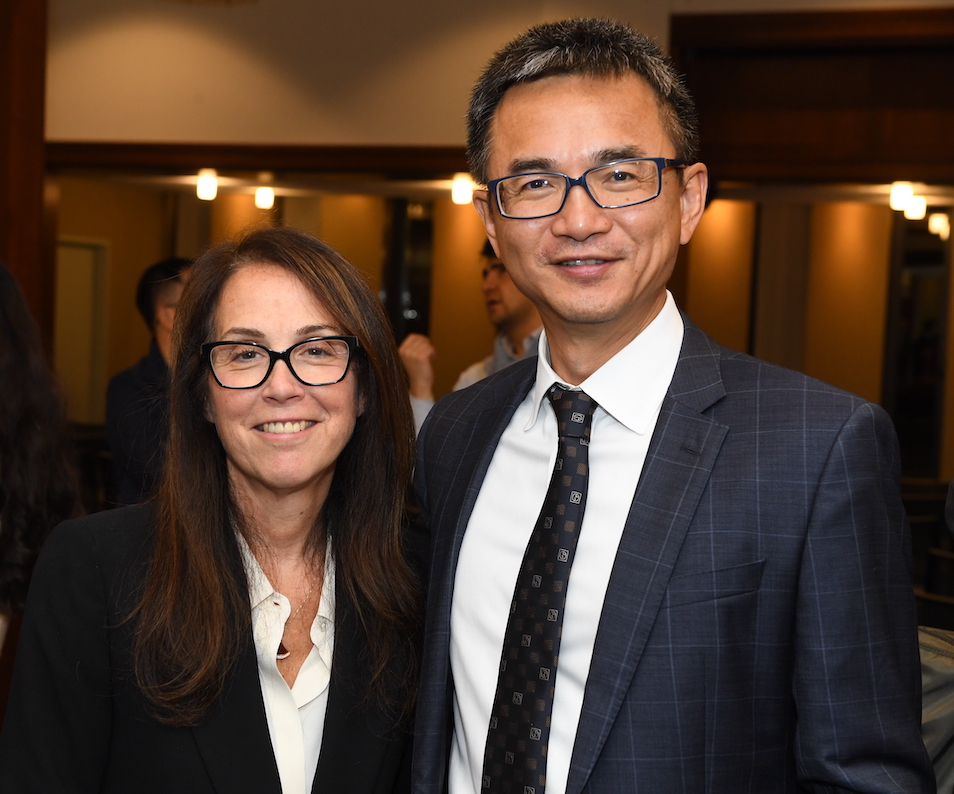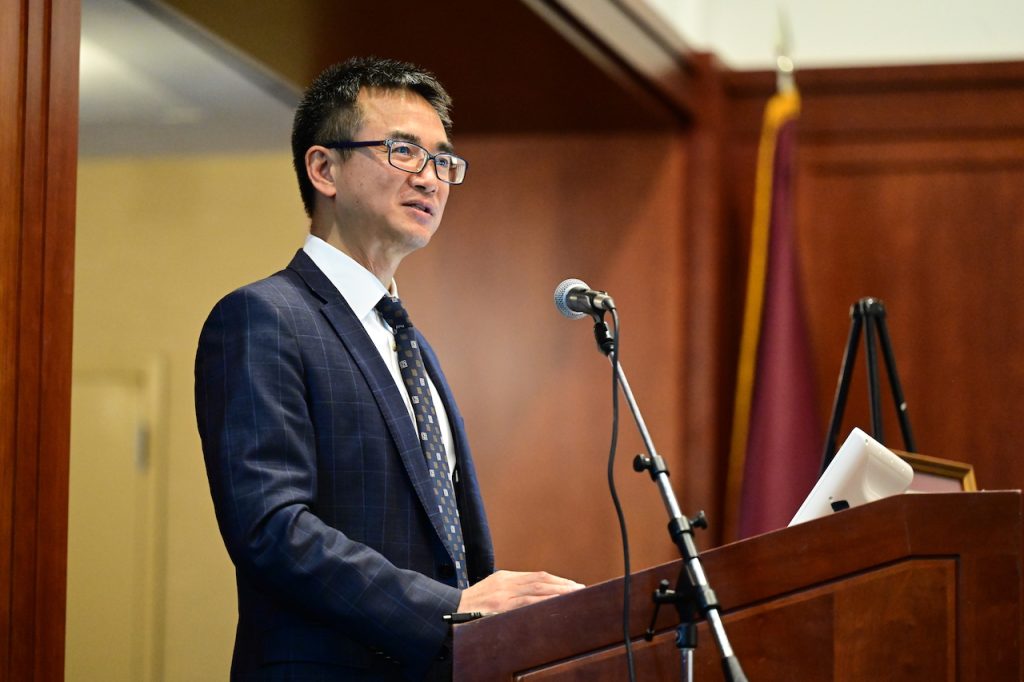Since finance professor An Yan joined Fordham in 2001, he has launched multiple programs that connect business schools worldwide to the Gabelli School. Part of this work fits into the Gabelli School’s mission, as he sees it, to educate students all over the world about business ethics and responsible business. But the motivation is also personal for Yan, who came from China to Boston College on scholarship for his Ph.D. Now that he is in a position to extend similar opportunities, Yan said, “I think that’s something I have to return, to help to educate students globally and give them a chance…and the skills to help advance their careers.”
Last month Fordham celebrated Yan’s appointment to the Robert Bendheim Chair in Economics and Financial Policy, which was established in 1996 with a gift from the Leon Lowenstein Foundation. He found time to talk about his work before leaving for a trip to China and Taiwan to meet with Gabelli School graduates and potential donors interested in supporting the school’s research.

Your current area of research is ESG—the environmental, social, and governance issues that corporations consider when making business decisions. Why are you drawn to this field and how does the Gabelli School emphasize this in its course offerings?
That’s part of the strategic research area of the Gabelli School. And also, of course, it’s something I’m passionate about. I spend a lot of time doing this research, trying to see what’s going on, what is wrong, and how we should be trying to educate the students, the market, and the investors.
Financial Markets and Responsibility is a core course for our Master’s in Finance program and one of the classes I teach. It serves as the starting point for our students to approach [ESG] in more holistic ways and in more scientific ways. And then after this core course, we have electives which are taught by adjuncts working in the field because the ESG landscape has been changing all the time. So those professionals…help our students to really get a hold of the most contemporary issues and challenges.

The Gabelli School [also]has a student-managed investment fund course that includes an ESG fund. This gives students first-hand experience in managing the portfolio in a sustainable way.
You delivered a lecture on ESG at your installation ceremony. What were the key takeaways?
The takeaway is that ESG is always part of strategic management. It used to be more opportunistic to game the system a little bit and to focus on one [pillar]while sacrificing another one. The recent development seems like the firms, they don’t do this trade-off anymore. My conjecture is, the financial market has become more sophisticated so they can recognize such opportunistic behavior [and they don’t reward it].
There seems to be a backlash against ESG right now. In 2022 Ron DeSantis associated the term with “woke capital.” At the start of this year, The Wall Street Journal ran a story with the headline, “The Latest Dirty Word in Corporate America: ESG.” What’s happening here?
I think it’s just unfortunate, right? It’s a lot of political pressure…but many firms—Unilever, Microsoft—are still [practicing ESG]. They have chief sustainability officers, CSOs. So it tells you they still want to do it. And many people talk about climate risk and how to help the climate. So that’s still there. ESG as a term could be in trouble. But as a practice, I still think many firms are still practicing it, although they may use a different phrase.
You teach at a Jesuit institution and you received your Ph.D. from one. What is it about this tradition that speaks to you?
Cura personalis [care for the whole person], that’s the key part. Of course there are different ways to talk about a whole human being, but I think one way [is]: just do the right thing. In the current world, you have so much information, different extremes, social media. Sometimes you get lost. I think we’re just trying to [teach]students—think about what’s the right thing to do…follow your value system.
This interview has been edited and condensed for clarity.

